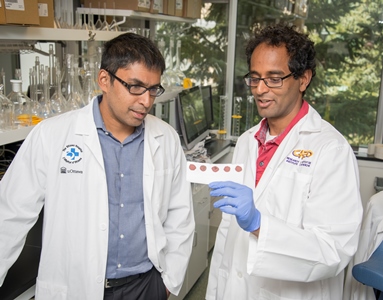Newsroom
Using big data to help the smallest babies – Canadian researchers use newborn blood tests to identify preterm children in low-resource countries
March 23, 2018
 Researchers from The Ottawa Hospital, the Children’s Hospital of Eastern Ontario and the University of Ottawa have received nearly US $1 million from the Bill & Melinda Gates Foundation to find out how often babies are born preterm in low-resource countries. Their novel approach uses data collected from routine newborn blood tests.
Researchers from The Ottawa Hospital, the Children’s Hospital of Eastern Ontario and the University of Ottawa have received nearly US $1 million from the Bill & Melinda Gates Foundation to find out how often babies are born preterm in low-resource countries. Their novel approach uses data collected from routine newborn blood tests.
Preterm birth is a leading cause of death among children under the age of five. Knowing how often babies are born preterm is essential for developing and evaluating health programs and policies. However, many low-resource countries do not have reliable data on this issue.
Dr. Kumanan Wilson and Dr. Steven Hawken are pioneering a solution for measuring preterm birth rates using newborn blood samples spotted onto paper. In Canada and other countries this practice is routinely used to screen for genetic diseases and metabolic disorders, but using it to assess preterm birth is new. Using these blood spots and big data analysis, the team has developed an algorithm capable of accurately estimating gestational age to within one to two weeks.
“We’re using metabolic fingerprints – unique patterns in specific molecules found in the blood – to help estimate gestational age,” said Dr. Wilson, an internal medicine specialist and senior scientist at The Ottawa Hospital and professor at the University of Ottawa. “If it works, this could be crucial to global efforts to reduce preterm birth and improve newborn health.”
Dr. Wilson’s team originally derived and validated the algorithm using data from Ontario newborns. This work has been published in the American Journal of Obstetrics & Gynecology and EBioMedicine. The team is currently testing the algorithm using newborn data from Bangladesh, Zambia, China and the Philippines. This new funding will allow the investigators to pilot the algorithm in Sub-Saharan Africa and South Asia and provide preterm birth estimates to participating countries.
This project is a collaboration with Dr. Gary Darmstadt of Stanford University and Dr. Pranesh Chakraborty of Newborn Screening Ontario and the Children’s Hospital of Eastern Ontario Research Institute. Other researchers from The Ottawa Hospital and the University of Ottawa who are involved in this project include Drs. Steven Hawken, Beth Potter, Mark Walker, Julian Little and Malia Murphy.
Dr. Darmstadt’s team will select and manage new international sites for the project, while Dr. Chakraborty will lead the analysis of the newborn samples. Dr. Wilson and his team will apply the algorithm and manage the results. Families that participate in the project will also have access to screening for treatable genetic disorders.
This new grant (worth US $948,502) follows two previous grants from the Bill & Melinda Gates Foundation to the Ottawa team (worth US $1.4 million and US $100,000). The foundation has also awarded US $2 million to Dr. Darmstadt and his team for their part of the project.
See related article “How a 50-Year-Old Drop of Blood Helps Solve an Urgent Global Health Challenge” from the Bill & Melinda Gates Foundation.
Dr. Wilson leads The Ottawa Hospital’s mHealth Lab, which is supported by donations to The Ottawa Hospital.
Photo caption: Dr. Kumanan Wilson (left) and Dr. Pranesh Chakraborty (right) are using newborn blood tests to identify preterm children in low-resource countries.
The Ottawa Hospital: Inspired by research. Driven by compassion
The Ottawa Hospital is one of Canada’s largest learning and research hospitals with over 1,100 beds, approximately 12,000 staff and an annual budget of over $1.2 billion. Our focus on research and learning helps us develop new and innovative ways to treat patients and improve care. As a multi-campus hospital, affiliated with the University of Ottawa, we deliver specialized care to the Eastern Ontario region, but our techniques and research discoveries are adopted around the world. We engage the community at all levels to support our vision for better patient care. See www.ohri.ca for more information about research at The Ottawa Hospital.
CHEO Research Institute
The CHEO Research Institute coordinates the research activities of the Children’s Hospital of Eastern Ontario (CHEO) and is affiliated with the University of Ottawa. Its three programs of research include molecular biomedicine, health information technology, and evidence to practice research. Key themes include cancer, diabetes, obesity, mental health, emergency medicine, musculoskeletal health, electronic health information and privacy, and genetics of rare disease. The CHEO Research Institute makes discoveries today for healthier kids tomorrow. www.cheori.org
University of Ottawa: A crossroads of cultures and ideas
The University of Ottawa is home to over 50,000 students, faculty and staff, who live, work and study in both French and English. Our campus is a crossroads of cultures and ideas, where bold minds come together to inspire game-changing ideas. We are one of Canada’s top 10 research universities—our professors and researchers explore new approaches to today’s challenges. One of a handful of Canadian universities ranked among the top 200 in the world, we attract exceptional thinkers and welcome diverse perspectives from across the globe. www.uottawa.ca
Media contacts
- Jennifer Ganton, Institut de recherche de l'Hôpital d'Ottawa, 613-798-5555 x 73325; 613-614-5253, jganton@ohri.ca, @OttawaHospital
- Aynsley Morris, CHEO Research Institute, 613 737-7600 x 4144; 613 914-3059, @CHEOHospital
- Véronique Vallée, University of Ottawa, 613-863-7221, vallee@uottawa.ca, @uOttawa
